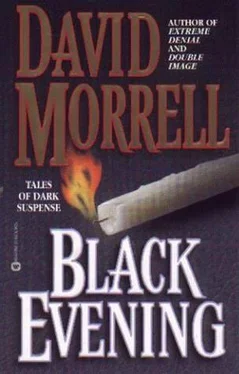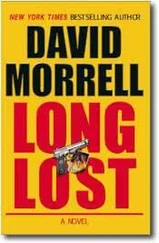David Morrell - Black Evening
Здесь есть возможность читать онлайн «David Morrell - Black Evening» весь текст электронной книги совершенно бесплатно (целиком полную версию без сокращений). В некоторых случаях можно слушать аудио, скачать через торрент в формате fb2 и присутствует краткое содержание. Жанр: Ужасы и Мистика, на английском языке. Описание произведения, (предисловие) а так же отзывы посетителей доступны на портале библиотеки ЛибКат.
- Название:Black Evening
- Автор:
- Жанр:
- Год:неизвестен
- ISBN:нет данных
- Рейтинг книги:4 / 5. Голосов: 1
-
Избранное:Добавить в избранное
- Отзывы:
-
Ваша оценка:
- 80
- 1
- 2
- 3
- 4
- 5
Black Evening: краткое содержание, описание и аннотация
Предлагаем к чтению аннотацию, описание, краткое содержание или предисловие (зависит от того, что написал сам автор книги «Black Evening»). Если вы не нашли необходимую информацию о книге — напишите в комментариях, мы постараемся отыскать её.
Black Evening — читать онлайн бесплатно полную книгу (весь текст) целиком
Ниже представлен текст книги, разбитый по страницам. Система сохранения места последней прочитанной страницы, позволяет с удобством читать онлайн бесплатно книгу «Black Evening», без необходимости каждый раз заново искать на чём Вы остановились. Поставьте закладку, и сможете в любой момент перейти на страницу, на которой закончили чтение.
Интервал:
Закладка:
Ida gave more commands to her waitresses and swung her dour gaze toward Grady. "I figured Brian must have had a nervous breakdown. I told him he couldn't afford a second property. But he wouldn't listen. He insisted he had to buy it. So despite my warning, he used this tavern as – what do they call it? – collateral. He convinced the bank to loan him money, found whoever owned that hollow, and bought the damned thing. That's the beginning of when he shut me out.
"The next thing I heard – it didn't come from him; it was gossip from customers in the tavern – was he'd arranged with a contractor to put in a swimming pool out there, some buildings, a barbecue pit, and… The next year when construction was finished, he invited me out there to see the grand opening.
"I admit the place looked impressive. I figured Brian was getting over his loss, adjusting to the deaths of his children. But after he, Betsy, and I and their friends – and my fucking, soon-to-be, ex-husband – had a barbecue, Brian took me aside. He pointed toward the woods, toward the pool, toward the buildings, and he asked me… I remember his voice was low, hushed, the way people talk in church.
"He asked me if I felt anything different, anything special, anything that reminded me of… anything that made me feel close to his dead children. I thought about it. I looked around. I tried to understand what he meant. Finally I said 'no.' The camp looked fine, I said. He was taking a risk with the bank. All the same, if he needed a place where he could get away and heal his sorrow, despite the financial risk, he'd probably done the right thing. 'Nothing about the swimming pool?' he asked. I told him I didn't understand what he meant, except that his children liked to swim. And with that, he ended the conversation. That was the last time he invited me out there. That was the real beginning of the distance between us. The barrier he put up. No matter that I saved his ass by taking care of the tavern back then, just as I'm taking care of it now."
Grady knew that he'd exceeded the limit of Ida's patience. He searched his troubled mind for a final question that might settle his confusion. "Do you know who owned that hollow, or why Brian suddenly felt compelled to buy it?"
"You might as well ask me who's going to win the lottery. He told me nothing. And I told you , I don't have time for this. Please . I'm trying my best not to be rude, but I've got customers. This is the busiest time of the day. Happy hour makes all these people hungry. I've got to make sure the kitchen's ready."
"Sure," Grady said. "I apologize for distracting you. I just wanted… I'm sorry, Ida. That's why I came here. To tell you how much I sympathize."
Ida glared toward a waitress. "Table eight still needs those onion rings."
Grady stepped back, ignored the stares of the factory workers, and left the tavern. As the screen door squeaked shut, as he trudged past pickup trucks toward his cruiser, he heard the customers break their silence and murmur almost loudly enough to obscure another mournful tune, this one by Buddy Holly: "I Guess It Doesn't Matter Anymore."
He radioed his office and told the dispatcher he was going home. Then he solemnly drove along sunset-crimsoned, wooded streets to the single-story house he'd shared with his wife and son.
The house.
It haunted him. Often he'd thought about selling it to get away from the memories that it evoked. But just as he hadn't disposed of Helen and John's possessions, their clothes, the souvenir mugs that Helen had liked to collect, the video games that John had been addicted to playing, so Grady hadn't been able to convince himself to dispose of the house. The memories tormented him, yes, but he couldn't bear to live without them.
At the same time, the house troubled him because it felt empty, because he hadn't maintained it since Helen and John had died, because he hadn't planted flowers this spring as Helen always had, because its interior was drab and dusty.
When he entered the kitchen, there wasn't any question what he'd do next. The same thing he always did when he came home, what he'd done every evening since the death of his family. He walked directly to a cupboard and pulled out a bottle of Jim Beam, poured two inches into a glass, added ice and water, and drank most of it in three swallows.
He closed his eyes and exhaled. There. The Compassionate Friends were emphatic in their advice that people in grief shouldn't seek refuge in alcohol. Brian and Betsy had emphasized that advice as well. There'd been no liquor bottles or beer cans at the camp, Grady had noticed. Whatever the cause of the murder-suicide, anger caused by drunkenness had not been one of them.
He'd pretended to follow The Compassionate Friends' advice. But at night, in the depths of his sorrow, he more and more had relied on bourbon to give him amnesia. Except that it didn't really dispel his memories. All it did was blur them, make them more bearable, stupify him enough that he could sleep. As soon as the bourbon impaired him enough to slur his speech, he would put on his answering machine, and if the phone rang, if the message was something important from his office, he would muster sufficient control to pick up the phone and say a few careful words that managed to hide how disabled he was. If necessary, he would mutter that he felt ill and order one of his men to take care of the emergency. Those were the only times Grady violated his code of professionalism. But just as he'd failed to maintain this house, so he knew and feared that one night he would make a mistake and inadvertently let outsiders know that he'd failed in other ways as well.
At the moment, however, that fear didn't matter. Sorrow did, and Grady hurriedly poured another glass, this time adding less ice and water. He drank the refill almost as quickly. Brian and Betsy. Helen and John. No.
Grady slumped against the counter and wept, deep outbursts that squeezed his throat and made his shoulders convulse.
Abruptly the phone rang. Startled, he swung toward where it hung on the wall beside the back door.
It rang again.
Grady hadn't put on the answering machine yet. The way he felt, he didn't know whether to let the phone keep ringing. Brian and Betsy. Helen and John. All Grady wanted was to be left alone so he could mourn. But the call might be from his office. It might be important.
Wiping his cheeks, he straightened, brooded, and decided. The bourbon hadn't begun to take effect. He would still be able to talk without slurring his words. Whatever this call was about, he might as well take care of it while he was still able.
His hand trembled as he picked up the phone. "Hello?"
"Ben? It's Jeff Clauson. I'm sorry to bother you at home, but this is important. When I phoned your office, one of your men told me where you'd be."
"Something important? What is it?"
"I've got some names. Tell me if they're familiar. Jennings. Matson. Randall. Langley. Beck."
Grady concentrated. "I can't put any faces to them. No one I've met. At least they didn't impress me enough to make me remember them."
"I'm not surprised. They don't… they didn't… live in Bosworth. They all came from nearby towns, to the west, between here and Pittsburgh."
"So why are they important? I don't get the point."
"They all died last Thursday."
"What?"
"After we finished at Brian's camp, we drove back to headquarters. We kept talking about what had happened. One of my men who wasn't on our assignment jerked to attention at the mention of Brian and Betsy Roth. He'd heard those names before, he told me. Last Thursday. One of the worst traffic accidents he'd ever investigated. Ten people killed. All in one van. A driver of a semitruck had a tire blow, lost control, and rammed into them. The investigation revealed that the victims in the van had all been headed toward a Fourth of July celebration in the mountains. To a camp. And that's why I wanted to talk to you. The camp was owned by Brian and Betsy Roth."
Читать дальшеИнтервал:
Закладка:
Похожие книги на «Black Evening»
Представляем Вашему вниманию похожие книги на «Black Evening» списком для выбора. Мы отобрали схожую по названию и смыслу литературу в надежде предоставить читателям больше вариантов отыскать новые, интересные, ещё непрочитанные произведения.
Обсуждение, отзывы о книге «Black Evening» и просто собственные мнения читателей. Оставьте ваши комментарии, напишите, что Вы думаете о произведении, его смысле или главных героях. Укажите что конкретно понравилось, а что нет, и почему Вы так считаете.












